Ayat Al-Kursi: Linguistic Analysis and Reflection
ٱللَّـهُ لَآ إِلَـٰهَ إِلَّا هُوَ ٱلْحَىُّ ٱلْقَيُّومُ ۚ لَا تَأْخُذُهُۥ سِنَةٌ وَلَا نَوْمٌ ۚ لَّهُۥ مَا فِى ٱلسَّمَـٰوَٰتِ وَمَا فِى ٱلْأَرْضِ ۗ مَن ذَا ٱلَّذِى يَشْفَعُ عِندَهُۥٓ إِلَّا بِإِذْنِهِۦ ۚ يَعْلَمُ مَا بَيْنَ أَيْدِيهِمْ وَمَا خَلْفَهُمْ ۖ وَلَا يُحِيطُونَ بِشَىْءٍ مِّنْ عِلْمِهِۦٓ إِلَّا بِمَا شَآءَ ۚ وَسِعَ كُرْسِيُّهُ ٱلسَّمَـٰوَٰتِ وَٱلْأَرْضَ ۖ وَلَا يَـُٔودُهُۥ حِفْظُهُمَا ۚ وَهُوَ ٱلْعَلِىُّ ٱلْعَظِيمُ ﴿٢٥٥﴾
Allah is He besides Whom there is no god, the Everliving, the Self-subsisting by Whom all subsist; slumber does not overtake Him nor sleep; whatever is in the heavens and whatever is in the earth is His; who is he that can intercede with Him but by His permission? He knows what is before them and what is behind them, and they cannot comprehend anything out of His knowledge except what He pleases, His knowledge extends over the heavens and the earth, and the preservation of them both tires Him not, and He is the Most High, the Great. TMQ [2:255]
Syntactic Analysis of the verse
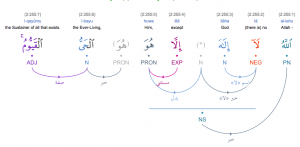
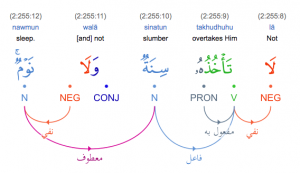
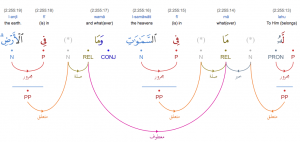
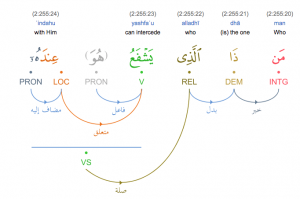
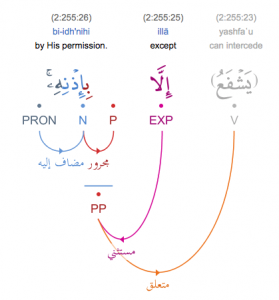
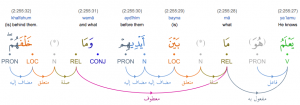
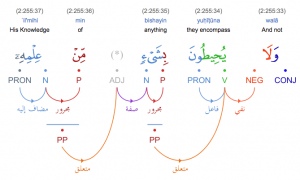
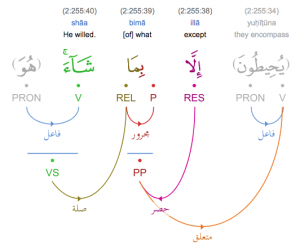
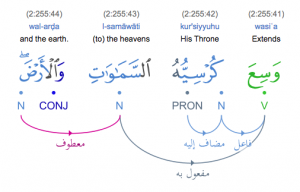
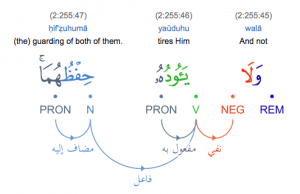
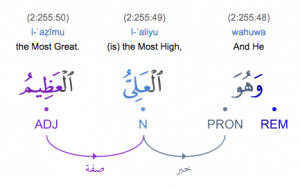
The meaning of لْحَىُّ ٱلْقَيُّومُ : the Everliving, the Self-subsisting by Whom all subsist
The verse begins with monotheism and negation of polytheism, and it is what is required first in the belief and that is His saying: ٱللَّهُ لَاۤ إِلَـٰهَ إِلَّا هُوَ and that is mentioned by way of informing about Allah, therefore Allah is the subject ( Mubtada) and informed about Him of what negates polytheism and affirms monotheism and it is His saying لَاۤ إِلَـٰهَ إِلَّا هُوَ.
Then all the sentences in the verse correctly inform about Allah. So He said:لَا تَأْخُذُهُۥ سِنَةٌ وَلَا نَوْمٌ ۚ and His saying: لَّهُۥ مَا فِى ٱلسَّمَـٰوَٰتِ وَمَا فِى ٱلْأَرْضِ and His saying: مَن ذَا ٱلَّذِى يَشْفَعُ عِندَهُۥٓ إِلَّا بِإِذْنِهِۦ ۚ يَعْلَمُ مَا بَيْنَ أَيْدِيهِمْ وَمَا خَلْفَهُمْ ۖ to the end of the verse, each sentence correctly informs about Allah who is the subject of the verse.
Therefore the verse focuses on Allah and His attributes and it is considered the master of all the verses of the Quran.
ٱلْحَىُّ ٱلْقَيُّومُ
The EverLiving, ٱلْحَىُّ – Perfectly described with life.
The Self-subsisting by Whom all subsist ٱلْقَيُّومُ – is on the pattern of a hyperbolic form for establishment/performing ( Al-Qiyam).
From the various meaning of ٱلْقَيُّومُ is – the maintainer of the affairs of His creation in terms of their creation their provision, His knowledge of their situations, the Maintainer of everything, and the Protector of everything and The self-sustaining, continuous maintenance of His creation. The one who suffers from slumber and sleep cannot be ٱلْقَيُّومُ – the Self-subsisting by Whom all subsist,
The two names have been made definite with the definite article (The) to indicate on exclusivity and perfection, so He said ‘ ٱلْحَىُّ’ and did not say ‘ هو حي’ then this will indicate he one of the living. He is the Everliving in the absolute sense because everything else that is alive will die except Allah the eternally living.
And He is ٱلْقَيُّومُ and He did not say [قيوم] so that none shares with Him in Maintainance and sustaining the creation, He is independent and self-subsisting.
The meaning of ‘slumber does not overtake Him nor sleep’
لَا تَأْخُذُهُۥ سِنَةٌ وَلَا نَوْمٌ
slumber does not overtake Him nor sleep;
The meaning of سِنَةٌ is slumber, and it preceded sleep. It came in Al-Kashshaaf :
The slumber has preceded the sleep because the sleepiness is from lethargy which is called slumber…in other words, He is not overtaken by slumber nor sleep and this is emphasising that He is self sustaining maintainer, because whoever this is possible for then it is impossible for him to be a maintainer. The slumber preceded the sleep in the verse because that is the natural order.
There sentence was repeated with the particle of negation [لَا] , so He said [ لَا تَأْخُذُهُۥ سِنَةٌ وَ لَا نَوْمٌ ] and did not say [ لَا تَأْخُذُهُۥ سِنَةٌ وَ نَوْمٌ] to indicate that it is not one of the two. If the [لَا] was omitted, then it is possible to negate the combination and that it is possible for one of them to occur. So it came with [لَا] to negate both of them individually or collectively. This means that :neither slumber or sleep overtakes him; slumber and sleep does not overtake Him.
The meaning of ‘whatever is in the heavens and whatever is in the earth is His’
لَّهُۥ مَا فِى ٱلسَّمَـٰوَٰتِ وَمَا فِى ٱلْأَرْضِ
whatever is in the heavens and whatever is in the earth is His
The relative pronoun [مَا] refers to things that don’t possess intellect or refers to attribute of the rational things , that is like His saying: فَٱنكِحُوا۟ مَا طَابَ لَكُم مِّنَ ٱلنِّسَآءِ – then marry such women as seem good to you [4:3] and His saying: وَنَفْسٍ وَمَا سَوَّىٰهَا ﴿٧﴾ فَأَلْهَمَهَا فُجُورَهَا وَتَقْوَىٰهَا ﴿٨﴾ – And the soul and Him Who made it perfect,Then He inspired it to understand what is right and wrong for it; [93:7-8] and the one who made it perfect is Allah (swt).
Therefore, He said [ مَا فِى ٱلسَّمَـٰوَٰتِ وَمَا فِى ٱلْأَرْضِ] to include the rational and the irrational things, and He did not say [مَن] then it would specify the rational ones only.
The prepositional phrase [لَّهُۥ] was brought first for restriction and exclusivity, so it indicates that it is His dominion only and no one shares with Him in this. The relative pronoun [مَا] is repeated to indicate the encompassing and comprehensiveness for whatever exists in them both i.e. in the heavens and the earth.
This was mentioned after His saying [ ٱلْحَىُّ ٱلْقَيُّومُ] to indicate that He is the Maintainer of affairs of His kingdom only, and that indicates absolute maintenance. Therefore, He is the one who maintains the management of His kingdom, not like anyone else who claim to manages affairs.
The meaning of ‘who is he that can intercede with Him but by His permission? ’
مَن ذَا ٱلَّذِى يَشْفَعُ عِندَهُۥٓ إِلَّا بِإِذْنِهِۦ ۚ
who is he that can intercede with Him but by His permission?
This is a statement about His kingdom and His Greatness and that no one has any power to talk on the day of Judgement except that He gives permission to speak like His saying: لَّا يَتَكَلَّمُونَ إِلَّا مَنْ أَذِنَ لَهُ ٱلرَّحْمَـٰنُ – they shall not speak except he whom the Beneficent Allah permits [78:38]
Therefore, this indicates His dominion, greatness in this world and in the hereafter, so His saying:
لَّهُۥ مَا فِى ٱلسَّمَـٰوَٰتِ وَمَا فِى ٱلْأَرْضِ
All that is in the heavens and in the earth belongs to Him, and it is not restricted to this world.
And His saying:
مَن ذَا ٱلَّذِى يَشْفَعُ عِندَهُۥٓ إِلَّا بِإِذْنِهِۦ ۚ
who is he that can intercede with Him but by His permission?
It is apparent that it is in the Hereafter, and this indicates that His dominion and His greatness is in both worlds.
The meaning is that no one can intercede without His permission. The rebuking question style is used here, which is stronger than simple negation. This saying indicates that He is the Living and The maintainer, because He is the one intercession is sought from and by His permission is intercession, therefore He is living. No one as able whatsoever to achieve intercession except by His permission. Indeed He is the only maintainer over everything.
You may say: Why did He say [ مَن ذَا ٱلَّذِى يَشْفَعُ] with additional [ذَا] with [مَن] and why did He not say: مَن ٱلَّذِى ?
The answer is that [مَن ذَا] that it possible that this is one word with the meaning of [مَن] with an extraneous ذَا for emphasis and it is possible that it is two words: [مَن] for interrogation with the demonstrative pronoun [ذَا] and the meaning is : [مَن هاذا] – Who is this?
If the word is one word, then it is stronger than [مَن] and more emphatic, due to increase of its construction i.e. larger the word the greater meaning. The position of it i.e. the word needs emphasis because no one is able to intercede except by His permission, and the meaning is ‘who is the one who will do it [من الذي يفعل؟]’
If [ذَا] is a demonstrative pronoun, the meaning is من هذا الذي يشفع؟ – Who, is this, that will intercede?
You may say: Why did he not say: [ من هذا الذي يشفع؟ ] ? as He said in Surah Al-Mulk:
أَمَّنْ هَـٰذَا ٱلَّذِى هُوَ جُندٌ لَّكُمْ يَنصُرُكُم مِّن دُونِ ٱلرَّحْمَـٰنِ ۚ إِنِ ٱلْكَـٰفِرُونَ إِلَّا فِى غُرُورٍ ﴿٢٠﴾ أَمَّنْ هَـٰذَا ٱلَّذِى يَرْزُقُكُمْ إِنْ أَمْسَكَ رِزْقَهُۥ ۚ بَل لَّجُّوا۟ فِى عُتُوٍّۢ وَنُفُورٍ ﴿٢١﴾
Or who is it that will be a host for you to assist you besides the Beneficent Allah? The unbelievers are only in deception.Or who is it that will give you sustenance if He should withhold His sustenance? Nay! they persist in disdain and aversion. [69:20-21]
The answer is that [ها] of drawing attention enters on the demonstrative pronoun for attention and emphasis. The situation in the two verses of Al-Mulk is stronger indication for challenge and it is stronger than what is in the verse of the throne, therefore the speech in them both is addressing the disbelievers, and this is not the case in the context of the verse of the throne. This is from one angle, and from another angle, that the context of the verse of the throne is about intercession while the context of the two verses in Al-Mulk is about helping and provision, and the situation of intercession is different from that of help and provision.
He (swt) said in the verse of the throne: [مَن ذَا ٱلَّذِى يَشْفَعُ عِندَهُۥٓ إِلَّا بِإِذْنِهِۦ ۚ ] and the intercession is seeking a need out of desperation which needs to be fulfilled, knowing that the matter is in the hand of the one who is greater than him, therefore He (swt) is gentle with His question.
Whereas He (swt) said in the chapter of Al Mulk:
أَمَّنْ هَـٰذَا ٱلَّذِى هُوَ جُندٌ لَّكُمْ يَنصُرُكُم مِّن دُونِ ٱلرَّحْمَـٰنِ ۚ إِنِ ٱلْكَـٰفِرُونَ إِلَّا فِى غُرُورٍ ﴿٢٠﴾ أَمَّنْ هَـٰذَا ٱلَّذِى يَرْزُقُكُمْ إِنْ أَمْسَكَ رِزْقَهُۥ ۚ بَل لَّجُّوا۟ فِى عُتُوٍّۢ وَنُفُورٍ ﴿٢١﴾
Or who is it that will be a host for you to assist you besides the Beneficent Allah? The unbelievers are only in deception.Or who is it that will give you sustenance if He should withhold His sustenance? Nay! they persist in disdain and aversion. [69:20-21]
This – as you see- this is a situation of comparison, and it is not a situation of intercession. So who can help and provide other than the Merciful, the Provider, if the Most Merciful withholds His provision, therefore none is a rival to Allah (swt), who is free from any rival, and this is not possible by anyone other than Allah, and due to this the Lord of Might asks by saying: who is this supporter, provider except me? Therefore additional attention (tanbeeh) was added.
This in addition to what is in this of ridicule of false deities of those who don’t recognise the Lord of the Worlds. So you see that the context of the verse in Sura Al Mulk requires additional drawing of attention, as opposed to the verse in sura Al Baqarah.
Additionally, the expression is the verse of the throne, gained two meanings: powerful interrogation, and the meaning of demonstration (Al-Ishara), so the meaning became: [مَن ٱلَّذِى يَشْفَعُ ?] and [مَن هَـٰذَا ٱلَّذِى يَشْفَعُ ?] Any other expression will not give these two meanings. If He said: مَن ٱلَّذِى يَشْفَعُ then the meaning of demonstration will be lost, and if He said: مَن هَـٰذَا ٱلَّذِى يَشْفَعُ the power of the question that it gives with [مَن ذَا] will be lost, Allah knows best.
The meaning of ‘He knows what is before them and what is behind them,’
ۚ يَعْلَمُ مَا بَيْنَ أَيْدِيهِمْ وَمَا خَلْفَهُمْ
He knows what is before them and what is behind them,
The intended meaning is that His knowledge encompasses of their situation, their affairs in the past and the future, and He is aware of the intercessor and the one who is motivated to seek intercession and He knows the condition of the one that intercession is sought for and if he is deserving of intercession, so He has complete knowledge and no one is given permission except from the perfect knowledge.
You may say indeed Allah (swt) said in Surah Al Maryam:
لَهُۥ مَا بَيْنَ أَيْدِينَا وَمَا خَلْفَنَا وَمَا بَيْنَ ذَٰلِكَ ۚ وَمَا كَانَ رَبُّكَ نَسِيًّا ﴿٦٤﴾
whatever is behind us and whatever is between these, and your Lord is not forgetful.[19:64]
So mentioned the Dominion [Al Mulk) and here in the verse of the throne is mentioned i.e. the knowledge [Al-Ilm ], so what is the reason for this difference?
The answer is that the context of the verse in Maryam is dominion so He said :
وَلَهُمْ رِزْقُهُمْ فِيهَا بُكْرَةً وَعَشِيًّا ﴿٦٢﴾ تِلْكَ ٱلْجَنَّةُ ٱلَّتِى نُورِثُ مِنْ عِبَادِنَا مَن كَانَ تَقِيًّا ﴿٦٣﴾تِلْكَ ٱلْجَنَّةُ ٱلَّتِى نُورِثُ مِنْ عِبَادِنَا مَن كَانَ تَقِيًّا ﴿٦٣﴾
and they shall have their sustenance therein morning and evening. This is the garden which We cause those of Our servants to inherit who guard (against evil). [19:62-63] and He said following it:
رَّبُّ ٱلسَّمَـٰوَٰتِ وَٱلْأَرْضِ وَمَا بَيْنَهُمَا فَٱعْبُدْهُ وَٱصْطَبِرْ لِعِبَـٰدَتِهِۦ ۚ هَلْ تَعْلَمُ لَهُۥ سَمِيًّا ﴿٦٥﴾
The Lord of the heavens and the earth and what is between them, so serve Him and be patient in His service. Do you know anyone equal to Him?[19:65]
Thus He mentioned that He will provide the people of paradise in the morning and evening, and mentioned that the servants who are pious will inherit the paradise, He is the one who provides, and He is the Owner and he is the one gives inheritance because He is the true Owner.
And He said: رَّبُّ ٱلسَّمَـٰوَٰتِ وَٱلْأَرْضِ وَمَا بَيْنَهُمَا – He is their Lord, meaning that He is their Owner, therefore it occurred in the context of ownership.
As for the verse of throne, His saying happened in the context of knowledge, because His saying: وَلَا يُحِيطُونَ بِشَىْءٍ مِّنْ عِلْمِهِ – but they do not comprehend any of His knowledge except what He wills – came after it. Therefore every expression is suitable for its place.
This is in addition to what was mentioned of ownership also in the verse of the throne, He said before it: ۚ لَّهُۥ مَا فِى ٱلسَّمَـٰوَٰتِ وَمَا فِى ٱلْأَرْضِ – All that is in the heavens and in the earth belongs to Him. Therefore it mentioned in it knowledge and ownership.
The meaning of ‘and they cannot comprehend anything out of His knowledge except what He pleases’
وَلَا يُحِيطُونَ بِشَىْءٍ مِّنْ عِلْمِهِۦٓ إِلَّا بِمَا شَآءَ ۚ
and they cannot comprehend anything out of His knowledge except what He pleases
His saying: بِمَا شَآءَ, it is possible that the [مَا] is used to indicate the verbal noun i.e. by His permission, and it is possible that the [مَا] is a relative pronoun, in other words, by whatever He wishes, thus He is the provider of their knowledge. The two meanings are combined with this expression: i.e. they do not comprehend any of that except by His permission, and by what He wills.
This indicates that that that no one knows anything except whatever Allah wills, and by the power of the One who wills to maintain the heavens and the earth and that they don’t even know themselves nor the creation had it not been for the will of Allah, because that is from His knowledge, and that that they do not comprehend anything except to the degree that Allah wills.
You may say that: Indeed He (swt) said in Surah Al -TA-Ha :
يَعْلَمُ مَا بَيْنَ أَيْدِيهِمْ وَمَا خَلْفَهُمْ وَلَا يُحِيطُونَ بِهِۦ عِلْمًا
He knows what is before them and what is behind them, while they do not comprehend it in knowledge. [20:110]
So it negated the complete comprehension of His essence.
And He said in the verse of throne:
وَلَا يُحِيطُونَ بِشَىْءٍ مِّنْ عِلْمِهِۦٓ إِلَّا بِمَا شَآءَ ۚ
and they cannot comprehend anything out of His knowledge except what He pleases,
So it negated the comprehension of anything of His knowledge, what is the reason for this?
We say that the verse in Surah Al Taha came after mentioning of the calf that Banu Israel took as a god, and no doubt that that knew god by knowledge, so they made him with their hands from gold. As for Allah (swt), nothing comprehends His knowledge, so this negates the comprehension of His essence (swt) , as for what is in the verse of the throne, then it is in the context of knowledge as we have mentioned.
The meaning of ‘His throne [knowledge] extends over the heavens and the earth’
وَسِعَ كُرْسِيُّهُ ٱلسَّمَـٰوَٰتِ وَٱلْأَرْضَ
His throne extends over the heavens and the earth,
His saying indicates that they are from His dominion, so His saying: لَّهُۥ مَا فِى ٱلسَّمَـٰوَٰتِ وَمَا فِى ٱلْأَرْضِ – All that is in the heavens and in the earth belongs to Him. – indicates that whatever in the heavens and the earth exists is His dominion, and His saying:وَسِعَ كُرْسِيُّهُ ٱلسَّمَـٰوَٰتِ وَٱلْأَرْضَ – His throne extends over the heavens and the earth; – indicates that the heavens and the earth is His kingdom, so that indicates that the heavens and the earth and whatever exists in them is His Kingdom.
This indicates that His Kingdom is more extensive than that by a lot, and that nothing can encompass His Kingdom of any knowledge, therefore the heavens and the earth and whatever exists in them and His Throne extend over them and they are like a ring in a vast desert.
And He said: وَسِعَ كُرْسِيُّهُ and did not say: [يسع] to indicate that it is expansive in actuality, and if He had said: [يسع] then it would inform that it is expansive to some degree and as if it did not happen, that is like your saying: تسع داري ألف شخص – my home will encompass thousand people – this does not indicate necessarily that it will encompass thousand people, whereas as if you say: وسعت داري ألف شخص – my home has encompassed one thousand people, then this indicates that the matter has been accomplished.
وَسِعَ كُرْسِيُّهُ ٱلسَّمَـٰوَٰتِ وَٱلْأَرْضَ
His throne extends over the heavens and the earth,
The meaning of ‘and the preservation of them both tires Him not’
وَلَا يَـُٔودُهُۥ حِفْظُهُمَا ۚ وَهُوَ ٱلْعَلِىُّ ٱلْعَظِيمُ ﴿٢٥٥﴾
and the preservation of them both tires Him not,
That is nothing burdens or strains Him. This indicates absolute self subsistence and power. It came with the negation particle (لا) on the imperfect verb to indicate absolute time, and that is continuity in the present and the future.
The meaning of ‘and He is the Most High, the Great.’
وَهُوَ ٱلْعَلِىُّ ٱلْعَظِيمُ
and He is the Most High, the Great.
The name ٱلْعَلِىُّ is from the word [العلو] meaning high, the one has power, authority, sovereignty, and the pre-eminence, the irresistible, majestic and true greatness. He is the most high, transcendent from any resemblance and supposed rivals. He truly is the Most High and the Greatest.
Note the description of Allah with these two noble attributes is mentioned in two places in the Quran, both of them in the context of the dominion of the heavens and the earth belonging to Allah. Firstly in this verse when He said: لَّهُۥ مَا فِى ٱلسَّمَـٰوَٰتِ وَمَا فِى ٱلْأَرْضِ and other in His saying in Sura Al Shuara : لَهُۥ مَا فِى ٱلسَّمَـٰوَٰتِ وَمَا فِى ٱلْأَرْضِ ۖ وَهُوَ ٱلْعَلِىُّ ٱلْعَظِيمُ ﴿٤﴾ – To Him belongs all that is in the heavens and all that is in the earth, and He is the Most High, the Most Great. [42:4]
Note that the verse of throne began with the two names of Allah and they are: ٱلْحَىُّ ٱلْقَيُّومُ – the Everliving, the Self-subsisting by Whom all subsist – and finished with two of His names – ٱلْعَلِىُّ ٱلْعَظِيمُ – the Most High, the Great. Every sentence in the whole verse points to the – the Everliving, the Self-subsisting by Whom all subsist- and to – the Most High, the Great.
The one besides Whom there is no god, the Everliving, the Self-subsisting by Whom all subsist; because the Deity requires to be living and to sustain His servants.
The one, slumber does not overtake Him nor sleep; He is the Everliving, the Self-subsisting by Whom all subsist.
The one, whatever is in the heavens and whatever is in the earth is His; He is the Everliving, the Self-subsisting by Whom all subsist. Because the Owner is living, and indeed to Him belongs all this, no doubt, that He manages the affairs of what He owns, maintains and looks after it, and that is the meaning of ٱلْقَيُّومُ – the Self-subsisting by Whom all subsist.
The one, none can intercede with Him but by His permission, ban because the one seeks intercession with Him by His permission is alive, no one can do that except by His permission, He is maintains everything that happens in His kingdom.
The one, who knows what is before them and what is behind them, and nothing comprehends His knowledge except what He wills, is the Everliving and the Self-subsisting by Whom all subsist.
Indeed the one whose throne extends over the heavens and the earth, is the is the Everliving and the Self-subsisting by Whom all subsist.
Indeed the one does not tire from the preservation of them both of them, is the is the Everliving and the Self-subsisting by Whom all subsist.
The Most High, the Great is EverLiving and the Self-subsisting by Whom all subsist.
Therefore every sentence in the whole verse points to the fact that He is the Everliving and the Self-subsisting by Whom all subsist.
Also, that every sentence in the verse points to the fact that He is the Most High and the Greatest.
The one besides Whom there is no god, He is the Most High, the Great.
The one, slumber does not overtake Him nor sleep; He is the Most High, the Great.
The one, whatever is in the heavens and whatever is in the earth is His;He is the Most High, the Great.
The one, that none can intercede with Him but by His permission,He is the Most High, the Great.
The one, who knows what is before them and what is behind them,He is the Most High, the Great.
The one, no one can comprehend anything out of His knowledge except what He pleases, He is He is the Most High, the Great.
The one whose throne extends over the heavens and the earth, He is He is the Most High, the Great.
The one who preserves them both never tires, He is the Most High, the Great.
The verse mentions things in pairs
Lastly, note that from the weaving of the expressions in this verse mentions things in pairs.
The verse began with two descriptions of the attributes of Allah: the Everliving, the Self-subsisting by Whom all subsist;
Mentioned two forms of sleep: slumber and sleep.
Mentioned the particle لَا twice.
Mentioned two of His kingdom: whatever is in the heavens and whatever is in the earth is His
Mentioned the relative pronoun مَا twice.
Mentioned two things from His knowledge: He knows what is before them and what is behind them
Mentioned the relative pronoun مَا twice.
Mentioned two things that his throne encompassed: His throne extends over the heavens and the earth
the verse ends with two of his attributes: He is the Most High, the Great.
His saying: Allah is He besides Whom there is no god, the Everliving, the Self-subsisting by Whom all subsist; was mentioned in two places: one of them in this verse and the other place in Sura al-Imran:
ٱللَّـهُ لَآ إِلَـٰهَ إِلَّا هُوَ ٱلْحَىُّ ٱلْقَيُّومُ
Allah, (there is) no god but He, the Everliving, the Self-subsisting by Whom all things subsist [3:2]
And He is the Most High, the Great was mentioned twice, once in this verse and other time in Sura Al-Shuuara in the fourth verse:
لَهُۥ مَا فِى ٱلسَّمَـٰوَٰتِ وَمَا فِى ٱلْأَرْضِ ۖ وَهُوَ ٱلْعَلِىُّ ٱلْعَظِيمُ
His is what is in the heavens and what is in the earth, and He is the High, the Great.[42:4]
